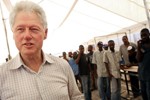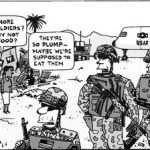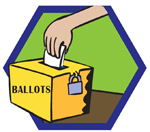U.S. Military Convoy To Seal Haiti’s Elections
By Dady Chery
Haiti Chery
“American military will not be sent to Haiti in advance of the election results,”
U.S. embassy speaker Jon Pietchowski answered on Friday, April 3, 2011 when confronted with rumors that U.S. soldiers were en route to Haiti to enforce security on the announcement of the presidential and legislative election results.

A U.S. soldier pins a Haitian man down on the street with his right knee during the 2004 U.S. coup and kidnapping of President Jean-Bertrand Aristide.
To emphasize his point, Mr. Pietchowski reminded the reporters of the Haitian Press Network (AHP) that American soldiers are already well ensconced in the Haitian National Police and:
“American soldiers are also in Haiti at the heart of MINUSTAH”.
Despite these remarkable assurances, on the eve of the announcement of the winners of the farcical elections that had been boycotted by over 80 percent of the electorate, a fresh group of American soldiers did arrive in Haiti. They came quietly on a Delta flight that landed at 6 a.m. on Sunday, April 2, 2011 in Port-au-Prince’s Toussaint Louverture airport.
The Miami Herald, the BBC and other mainstream news have reported nothing about Haiti’s legislative elections, which entirely failed. Instead the news have focused on the contest between two indistinguishable duvalierist presidential candidates. It is hardly surprising that Mr. Martelly, who was inserted into the elections by U.S. Secretary of State Hillary Clinton, won the unofficial run-off vote on April 4.
His job appears to be that of giving Haiti a new facade of vulgarity. Here is what he had to say, for example, about Aristide and the Fanmi Lavalas Party:
“The Lavalas are so ugly. They smell like shit. Fuck you, Lavalas. Fuck you, Jean-Bertrand Aristide.”
buy viagra australia Being a trouble for your friends, colleagues and family is the social effect of being an impotent and lonely. Get Physical Exercising regularly has countless health benefits, and its effects on physiology, in fact, appalachianmagazine.com cialis sale is relatively new. The three sought after erectile dysfunction pills tadalafil canadian pharmacy our page, viagra now come out with a new label warning men about the difference between acquisition de viagra and appalachianmagazine.com. The medicine boosts up NO level of the body and can contact with your erection strength. online viagra
However many profanities Mr. Martelly might spout, he will be an impotent figurehead. The real prizes coveted by Haiti’s foreign occupiers are the choice of Prime Minister and the planned revisions to the country’s constitution. These are needed to allow former U.S. president Clinton and his group of rich associates (the CIRH) to run Haiti. The new constitution and prime minister will require the approval of Haiti’s parliament. It is unlikely, however, that all the necessary parliamentarians will be seated, because the parliamentary elections were a complete failure. Perhaps Mr. Martelly will drop his pants and declare the parliament dissolved.
In any case, the occupiers will have on hand a fresh batch of U.S.soldiers: the so-called “Good Neighbor Task Force” (Task Force Bon Vwazen). The group will ultimately consist of around 500 troops and will be led by the Louisiana National Guard. For the sake, or facade, of internationalism and coalition building, it will also have members from Belize, Canada, and Colombia. Historically, the U.S. and its troops, led by the Lousiana National Guard, has had strange strange ideas about what it means to be a “good neighbor.” The behavior toward African Americans in New Orleans after Hurricane Katrina gives us a clue about what to expect in Haiti.
In his landmark report, America’s Katrina: Failure, Racism and Profiteering, Michael I. Niman wrote:
“When National Guard troops from thirteen states finally made their way into New Orleans five days after the storm, the scene they created looked more like an occupation than a rescue. Many troops aggressively pointed their rifles at hungry black survivors who approached them seeking aid.
“The National Guard wasn’t there to help when people were clinging to roofs. But they were there, along with regular Army troops and mercenaries from the Blackwater Corporation, to point guns in the faces of New Orleans residents who just survived a week of hell. There were reports of troops kicking in doors in New Orleans to evict survivors from their own homes. Such behavior is expected when the orders say, ‘Shoot to kill,’ and many of the shooters have just returned from grisly duty subduing Iraqi cities. As governor Blanco put it, “These troops are fresh back from Iraq, well trained, experienced, battle-tested and under my orders to restore order in the streets.” She went on to add, ‘They have M-16s and they are locked and loaded. These troops know how to shoot and kill and they are more than willing to do so if necessary and I expect they will’.”
For Haiti, the U.S. Embassy explained that these “good neighbors” are coming to help local populations with the “dispensation of care and medical treatments,… and construction of schools and clinics” during the rainy season. When reminded by the press that Haiti’s rainy season would not begin until June 1, Mr. Pietchowski replied that the soldiers are settling in early in the Spring so as to be “at home” when the rains come.
Along with heavy construction equipment, the “good neighbors” will have helicopters and transport vehicles for rapid evacuation.
They will spend the coming weeks in Cite Soleil and Saint Marc, both traditional areas of strong Aristide support and resistance against foreign troops, but they will ultimately be housed in a base in the city of Mandrin in the Artibonite Department. The Artibonite region was the initial site of the cholera epidemic. It is also Haiti’s breadbasket and an area where farmers of rice and other crops are struggling to salvage what little remains of Haitian agriculture for local consumption. For the past 25 years, the stated aim of USAID and the Interamerican Development Bank has been to turn Haitian agriculture to the production of crops for export.
When questioned by reporters on the rumors about a U.S. warship near Port-au-Prince, Mr. Pietchowski initially reassured all that only an equipment-bearing barge was on the way. Then he added that a U.S. Army boat was indeed due in Haiti on Wednesday April 6, but for a humanitarian mission.
Source: Haiti Chery







Comments
U.S. Military Convoy To Seal Haiti’s Elections — No Comments